Congregational and Institutional Responses
Item Set
Title
Congregational and Institutional Responses
Description
A collection of responses religious congregations and other institutions are making, such as communications, services, liturgical or legal texts, and so forth.
Items
-
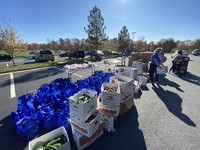
Food Distribution
These images show how Dar Al Noor came together to distribute food to their community, such as their bi-weekly food distribution and hot meals during Ramadan -
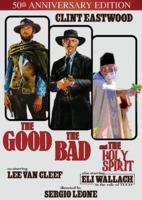
Going Viral: St. Ambrose Parish, Father Tim Palec, and the Blessing of the Easter Foods
In mid-May, Father Tim Palec went viral for the way he maintained St. Ambrose's traditional Blessing of the Easter Food Baskets. Dressed in protective gear and using a water gun, Father Palec maintained social distance while carrying out the traditional blessings in a nontraditional manner. The drive-thru blessing took place on April 11, but quickly became viral about a month later (even appearing in several news articles). An image of Father Palec with the water gun made its way to a subreddit called r/photoshopbattles, where redditors photoshopped Father Palec onto movie posters and into a multitude of different scenes, ranging from Star Wars to World War II to exoricisms to a crusade and more. In addition to becoming a viral meme, the church has also stood out for the way it has honored and memorialized Michigan's victims of COVID-19: they've tied a ribbon for each life lost on the trees in front of their church. St. Ambrose Parish offers Sunday mass through Facebook live and their website, and shares posts about different ways members can help the greater community during the pandemic. -
Worshipping Together From Home
I was raised in Houston in the Methodist church and became actively involved at a young age. I began leading worship during services on Sundays with the worship team at the beginning of high school and continue to lead today when I’m home from college. As I’m now in college in Austin rather than Houston, I found a new church home but did not engage in leading with the worship team there. I missed being able to lead others in worship through music and feel the power that worship can bring to a congregation. I was displaced by the COVID-19 pandemic and had to come back to Houston - I was asked to rejoin the worship team and help them with the move to online worship. This move to online services greatly affected the dynamic of the whole church, as we value fellowship and communal worship. Our services are now all pre-recorded, instead of live, and we are unable to meet together to engage in our faith as a physical group. Our faith puts a strong emphasis on the importance of community, and by being stuck in our homes with no ability to worship with others, our faith can be tested at times and it can be difficult to find the motivation to engage in worship. A lot of work goes into making sure that people still feel connected throughout this time, but the move to online worship through music has been most affected. The first few online services after our church closed its doors due to the virus consisted of our worship pastor and I putting out content for people to be able to worship to. After a few Sundays of this, the he decided that we needed a better way to engage the congregation and provide a more community based sense of worship, other than just two people singing when we normally have a whole band. Since we engage in a more contemporary way of worship rather than traditional, we figured it wouldn’t be too daunting of a task to have a few people record their own parts, send them in, and then piece them all together. This move to a more traditional kind of worship that we engage in normally helped to rebuild those emphases of community and worship through fellowship that we, as a church, hold so dear. Even though we aren’t able to worship together physically, seeing these videos every week and hearing my family sing along reminds me that even though we can’t be together, we can worship together from home. -
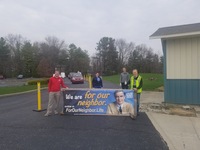
Free Pet Food Helps People Cope with COVID 19
CrossRoads Church at Westfield in Indiana created a unique way to help people during this pandemic - a drive-through free pet food give-away. People are without jobs and finding it difficult to have enough money to provide for all of their needs. Not knowing how they are going to make ends meet and the fear of how their health may be affected by COVID 19 is creating lots of anxiety and stress. When times get tough, people still take care of their pets even if it means people may not have enough money for their own food or prescriptions. In times of high anxiety, pets are stress relievers and anxiety reducers. So we decided that we could free up some resources families could use for themselves and at the same time feed the pets that help alleviate anxiety and stress for their owners. Thus...Free Pet Food Saturdays! -
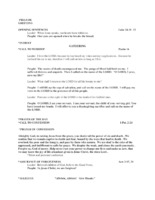
Longs Run Trinity Presbyterian April Bulletins
The Third Sunday of Eastertide. Details the order and events of that day's virtual service. -
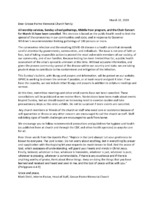
A Religious Response to Covid-19 from a Presbyterian Community of Faith Near Detroit
This response documents the initial and early communications of a Presbyterian pastor to a congregation on the outskirts of Detroit, Michigan, as the Covid-19 pandemic swept through this geographic region (March and April, 2020). Included in the documents are mail and email communications to the congregation, reflections on seasonal observances of the Christian church in light the pandemic (Lent, Holy Week, Easter), and a sermon specifically addressing personal and community and faith issues in response to the pandemic. Relevant demographic information of this community of faith: denomination, Presbyterian Church USA; size 1,200 members; location is largely affluent suburban community bordering Detroit; racial composition is overwhelmingly white. Context of pastor and faith community: pastor (white male mid-sixties) has served since November 2019 as the interim head of staff in a temporary position (pastor's experience includes 40 years as a Presbyterian minister); the congregation's senior pastor moved to another congregation June, 2019 and is in a transitional time between called pastors. -

Virtual Worship Service
April 19th was our seventh Sunday of not gathering together in person for worship. Each week, we've tried to provide a simulacrum of a worship service through Facebook and YouTube. This week, I (as pastor) took my sermon out into nature. Pastoral ministry these days is surreal, bizarre, and exhausting, but we continue trying to foster spiritual health and growth within our congregation. -
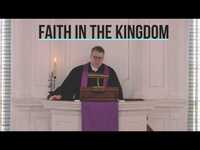
Moving Communion Online: What would Calvin say?
Months before the COVID-19 virus spread, forcing us to move our worship services online, our congregation made the decision to schedule communion for March 29th, the week before Palm Sunday. As we planned worship for that week, we struggled with whether / how to celebrate communion online. There were practical questions as well as theological questions to address. Our Constitution (Part II. Book of Order) is clear that communion is to be celebrated in the gathered congregation, or at least immediately following worship as part of a pastoral call to members who cannot be present in the worship service itself. As Christians in the Reformed Tradition, we ultimate found that our theology of the sacrament of communion (informed by our theological forebear, the 16th century reformer John Calvin) and what we understand to happen in communion, made it feasible for us to proceed to celebrate communion online. The experience was remarkable. We found that the spiritual connection to the Communion of Saints (as Calvin described those of every time and place who call on Christ's name) was palpable, and a gift for us all, especially at a time when we were not permitted to connect with Christ and one another in the same physical space. -
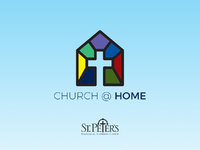
Church @ Home
We didn't realize it at the time, but apparently a few of us at St. Peter's Lutheran were preparing to do church during a pandemic. During the last few years we have shifted to a giving resource called Tithe.ly that allows for easy digital online give. We also began streaming one of our church services. Both of these resources were sort of utilized by the congregation, but now they are being heavily utilized. We began a service called Church @ Home, where church and lay leaders contribute to the service from their homes. Every Sunday morning one of our rooms turns into a recording studio with lights, microphone, web camera, and projection streaming software. We've been doing a mixture of live and pre-recorded video and audio. We've been supplementing these streams with zoom small group gatherings. We are 7 Sundays in and I feel a longing from my congregation to be incarnational...to somehow see each other in person. People are putting on a brave face, but the longing is creeping up in different ways. We are an affluent congregation, and so the number one question I hear is, "What can I do? How can I help?" We are creating a relief fund based on donations to help people in financial need. The fund will first help church members, but I foresee it being used for the greater community. As we are trying to tend to the present, the leadership is attempting to look into the future and imagine how life at church can be...given that it needs to be different from before. -
St. Edward’s Roman Catholic new normal
We now attend mass via Youtube viewing of live Mass celebrated by our Pastor. Our Holy Week and Easter Sunday celebration was an empty church except for the priest, the cantor and a couple others to carry out the Mass. While listening to Easter music, eyes closed, it was if I was in church seeing our congregation like every other Easter I celebrated for the last 55 years. Open my eyes, I was in my pajamas in my family room looking at Mass on my iphone. Unimaginable! Somehow my spirit was connected to a higher being and felt grateful for my faith. Our diocese is ringing bells at area churches giving thanks to the doctors and nurses and all frontline workers. -
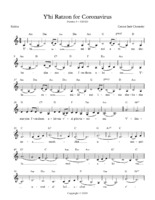
Y'hi Ratzon -- Safe Together Apart
I am Cantor at a Conservative synagogue (Jewish) in Columbus, Ohio. I wrote this song/prayer shortly after the arrival of what was first called Coronavirus, then Covid-19 -- before the word pandemic was being commonly used. The song/prayer had coalesced by March 20. It is based on a somewhat obscure passage in the weekday Torah service (the Torah is read every Monday and Thursday) -- a passage theoretically recited between raising the Torah and returning it to the Ark. The original prayer asks God (our Father) to protect us from desolation and pestilence. I broadened it -- both in Hebrew and in English -- to think of God as both Father and Mother -- and to ask for protection for all of us (not just "b'nei Yisrael" -- the children of Israel) -- brothers and sisters in this country and around the world -- and to keep us Safe Together Apart -- which is the unique challenge to us in these times. I typically do either the Hebrew or the English (generally not both) between various services -- or in the midst of some services -- probably about 5x per week. As we still follow our basic traditional rituals, it hasn't altered the prayers that we do. . . it just gets added here and there. And I share it with other cantors, other Jewish spiritual leaders, and leaders of other faiths, at all appropriate opportunities. -
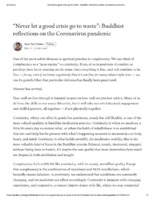
“Never let a good crisis go to waste”: Buddhist reflections on the Coronavirus pandemic
An offering to the community from Sean Feit Oakes, this piece was written early on in the US experience of COVID-19, but it still contains relevant information for how to spiritually process the virus through the lens of a Buddhist practitioner. I tried to share it from Medium, but I got an error message, so I tried sharing his website front page, as the document is accessible via a hyperlink on that page. That didn't work either. Here is the link: https://medium.com/@seanfeitoakes/never-let-a-good-crisis-go-to-waste-buddhist-reflections-on-the-coronavirus-pandemic-f775f348e781 -
Pandemic Ramadan
The Muslim month of fasting is usually a time of more than usual communal get togethers. Not only are Muslims more inclined to perform prayers at their mosques, but in Sunni Muslim tradition, the month involves supererogatory prayers at night throughout the month. On one particular night during the month, when it is believed by both Sunni and Shi’a Muslims that the Quran first began to be revealed, all night vigils and prayers are offered. The special ritual obligations of the month are complemented by special social obligations. The breaking of the fast at the end of each day is occasion to invite family, neighbors, friends, strangers to the table to share in a meal of thanksgiving. As well, it is considered commendable to feed the poor and offer extra charity to those in need during the month. Traditionally this is done personally, to those in the community or neighborhood. Both spiritual and social obligations of the month will be tremendously impacted by the pandemic, in Muslim majority societies and here in the USA. Below is one Muslim community’s response to the challenge. -
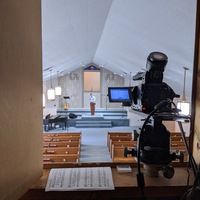
Preaching to an empty room
Our church usually sends a video feed of the worship service into other rooms so that people who cannot easily sit in the sanctuary can still see and hear the preaching. The technology we use to make this possible has been pressed into service for broadcasting a live-streamed service to members' homes. Our pastors are having to learn how to speak to a camera at the back of an empty room. The goal is to seem as "normal" as possible, but the usual attentive faces are no longer present and their feedback cannot sustain the preacher's energy. -
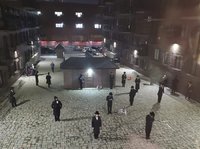
Minyan in Brooklyn, Photograph by Jacob Kornbluh
Orthodox Jewish minyan, March 17, 2020 -
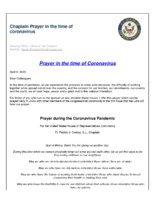
Prayer in the time of Coronavirus by the Chaplain of the House of Representatives
A Prayer during the Coronavirus Pandemic for the United States House of Representatives Community, by Fr. Patrick J. Conroy, S.J., Chaplain. -
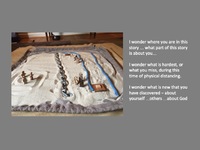
Godly Play via Zoom
For several years the idea of offering Godly Play – a method of spiritual formation grounded in research on children’s spirituality and play – in a virtual setting has been floated, primarily as a means of training leaders/mentors in remote or rural areas who don’t have easy access to in-person training. I admit, I was a skeptic from the start, even as one among a group of trainers who explored the topic – especially as such a key element of Godly Play is the relational, community component. Then came COVID-19, with virtual gatherings being the only way to connect, and I have, so to speak, taken the plunge. At last count, I’ve offered 12 Godly Play sessions via Zoom in just the past several weeks. It’s been a steep learning curve, and each time I’ve discovered something new about the mechanics of it … but I’ve also made some discoveries. What I’ve seen is that, while this new way of gathering for Godly Play is not the same, it can be nurturing and spirit-filled. We’ve had, in most sessions, a mix of intergenerational experiences that wouldn’t have otherwise happened. We’ve gathered as a community – “building our circle,” experiencing a story presentation, wondering about the story together, sharing in prayers, and offering blessings and goodbyes. During the “wondering time,” thoughtful responses have been given and received by all age groups, ranging from preschoolers to those in their eighties—and, rather than what often happens when children are put on a pedestal or laughed at or just otherwise seen as “cute,” there’s been a level of respect among the generations and the sense that all are on equal footing. One wondering this past week (which I share with his permission) came from a fourth grader who, because of his significant challenges to express himself in the usual ways, uses a letter board to communicate — "I'm pretty sad about Jesus," he said [in reference to his dying on the cross], and "I'm not sure how I fit in." The stories we share, and the opportunity to make meaning through wondering as a community, offer us the chance to wrestle with the existential issues we all face, including our need to belong. This child named that longing, for all of us I believe, especially at a time when we cannot physically be together. Thoughtful wondering among adults and children continued – both out loud and in the “chat,” and was interspersed with periods of silence. I’ve found that in these online sessions we've had participants show up — both adults and kids — who have never, or rarely, given Godly Play a try in person, including some of our parents who are for the first time getting a peek into what it’s like being “in the room where it happens” (even though we’ve often offered such opportunities in person). In part, that may just be a matter of how easy it is to join the session — you can decide right at the last minute — but whatever the reason, participation of newcomers has been noticeable. The child I mentioned above has never been able to participate in person in the way he was able to online – perhaps this online experience will be a bridge to his involvement in the flesh, or maybe this will just be a different way for him to participate going forward. In either case, I’m seeing this as a way to provide access to those who, for whatever reason, are not able to show up in person. Looking toward the future – which is hard to do more than an hour or two at a time right now – while none of us knows how this pandemic and physical distancing will end, I don’t imagine it will, nor should it, all end in a big splash with everyone overnight being ready to gather in crowds. One of the questions we are considering as staff and leadership of our church is, “What practices/ways will we discover in this time that we want to hold on to?” – a corollary, I think to the Godly Play prompt, “I wonder what we can leave out and still have all we need …” I am wondering whether we will want to continue to offer these online/live sessions – not instead of but as an alternative – even when we begin to go “back to normal,” whatever and whenever that will be. Images include the story “Exile and Return” and the Screen Share we offered in closing of the “Faces of Easter” Lenten series. Note: Godly Play materials and images are copyrighted. The Godly Play Foundation has been supportive of efforts to share virtually and has offered guidelines for doing so on its website: https://www.godlyplayfoundation.org